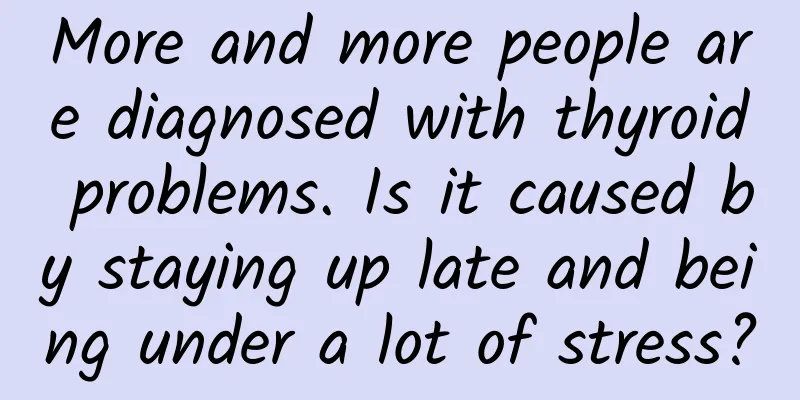More and more people are diagnosed with thyroid problems. Is it caused by staying up late and being under a lot of stress?

|
Many people have similar doubts: going to the hospital for a physical examination, I found that I actually had thyroid nodules. When I talked with colleagues and friends, I found that people around me had some thyroid problems, and many of them were actually young people. So the prevalence of thyroid-related diseases is getting higher and higher, and it is getting younger and younger? Therefore, some questions may arise: Why is this the case? Is it because of the current work and life pressures, and the love of staying up late? There is even a saying that "staying up late will shorten the life of the thyroid gland." Is this true? As a young person who values life, what should I do? For example, go to bed early? Eat less iodized salt? Don't worry, today's article will answer your questions. What is the function of the thyroid gland? The thyroid gland is located just below the larynx, surrounding the anterior and lateral part of the trachea. It is similar in size and shape to a butterfly. Because it looks like ancient armor, it is named thyroid gland. Copyright images in the gallery. Reprinting and using them may lead to copyright disputes. The thyroid gland uses iodine as a raw material to synthesize and secrete thyroid hormones, which, by acting on major organs throughout the body, play an important role in many aspects, such as material and energy metabolism, sympathetic nerve excitement, and skeletal muscle health. When the thyroid gland secretes hormones abnormally, it can lead to hyperthyroidism (hyperthyroidism, increased secretion) or hypothyroidism (hypothyroidism, decreased secretion). What are the common thyroid diseases? Hyperthyroidism The most common cause of hyperthyroidism is Graves' disease (an autoimmune disease, accounting for about 60% to 80%). Other causes include transient hyperthyroidism caused by various thyroiditis, hyperfunctioning thyroid adenomas, etc. Hyperthyroidism often has clinical manifestations such as intolerance to heat, excessive sweating, palpitations and tremors, irritability, weight loss, and increased bowel movements. Hypothyroidism Contrary to hyperthyroidism, hypothyroidism is manifested by fear of cold, fatigue, lethargy, weight gain, constipation, dry skin, easy hair loss, etc. The most common causes of hypothyroidism include Hashimoto's thyroiditis, iodine deficiency, thyroid surgery or iodine-131 treatment, etc. Thyroid nodules Thyroid nodules are quite common. Ultrasound studies have found that approximately 20% to 76% of women have at least one thyroid nodule, and the prevalence increases with age, with a higher prevalence in women than in men. High-risk factors for thyroid nodules include obesity, smoking, drinking, etc. The vast majority of thyroid nodules are benign, and the probability of malignancy is estimated to be far less than 5%. Thyroid cancer High-risk factors for thyroid cancer include family history, age (children are higher than adults), gender (males are higher than females) and thyroid irradiation. More than 90% of thyroid cancers are differentiated thyroid cancers (papillary cancer, follicular cancer). This type of thyroid cancer has a very good prognosis, with a long-term survival rate that is no different from that of normal individuals, and patients usually do not die from thyroid cancer itself. Some of these cancers can even be followed up with ultrasound only after the doctor has made a comprehensive assessment and fully communicated with the patient. Prevalence of thyroid disease Getting taller and younger? I often see a statement online that "Nowadays, more and more people are suffering from thyroid diseases, and even more and more young people are suffering from thyroid diseases. This is because young people nowadays are under a lot of pressure and like to stay up late." Is this really the truth? In fact, there are no international guidelines for thyroid cancer screening for the general population, and screening is usually only recommended for people with the above-mentioned high-risk factors. The "increasing" incidence of thyroid nodules (cancer) around us that we perceive should be attributed more to the increased popularity of physical examinations and ultrasound among the general population, which has led to an "increase" in the detection of existing thyroid nodules (cancers). To sum it up in one sentence: it’s not that more people are sick, but that more people are being diagnosed. We also do not recommend self-examination of the thyroid gland. This is because studies have shown that even experienced thyroid specialists can only detect about 50% of nodules confirmed by ultrasound. And about 50% of "positive" nodules found by physical examinations cannot be confirmed by ultrasound. In addition, for nodules <2cm, the detection rate of physical examinations is very low. If this is the case for professional doctors, the accuracy rate of ordinary people can be imagined, which is like "drawing lots". Self-examination will only increase anxiety and unnecessary examinations. Of course, if you do find a thyroid nodule on ultrasound for other reasons, you still want to see a specialist, who will make recommendations based on the ultrasound findings. The practice of "solving the problem with surgery" is neither standard nor advisable. Iodine and Thyroid Health I believe that many readers know that iodine has some relationship with the thyroid gland. When thyroid nodules are found during physical examinations, many people begin to regard iodized salt as a major enemy. In fact, my country is one of the countries with the most serious iodine deficiency. Iodized salt is the main source of iodine we need daily (accounting for about 70% of the total intake), and each gram of iodized salt contains about 20-30ug of iodine. The normal iodine intake recommended for an adult individual is 150ug per day, 220ug/day during pregnancy and 250ug/day during lactation. The upper limit of the safe daily iodine intake recommended by WHO is 1000ug/day. Therefore, our daily diet will not exceed the safe upper limit of iodine intake. Moreover, there is currently no sufficient evidence to prove a clear causal relationship between excessive iodine intake (exceeding the normal recommended amount) and thyroid nodules (cancer), autoimmune thyroiditis (Hashimoto's thyroiditis, etc.), TPO antibody positivity, etc. On the contrary, the hazards of iodine deficiency are very clear, including hypothyroidism, endemic goiter, and the effects of deficiency during pregnancy on the development of the fetal nervous system. Therefore, most patients with thyroid diseases (such as thyroid nodules and Hashimoto's thyroiditis) do not need to restrict iodine diet or switch to iodine-free salt. As long as they have a normal and balanced iodine intake, they will be fine. However, there are a few exceptions, such as patients in the early stages of Graves' hyperthyroidism drug treatment and those who are scheduled for iodine-131 treatment. Please consult an endocrinologist for specific situations. Diet and Thyroid Health Selenium and the Thyroid Selenium is an essential trace element that is required for the activity of deiodinase (an important enzyme related to the synthesis of thyroid hormones). It also has immune regulation and antioxidant effects. The daily intake recommended by WHO is 60~200 μg, and the maximum tolerable intake is 400 μg. There are many natural foods high in selenium in daily life, such as meat, eggs, fish, seafood and animal offal. In addition, vegetables such as shepherd's purse, asparagus, cabbage, pumpkin, onion, tomato, etc. also contain a certain amount of selenium. Therefore, as long as the normal population has a balanced diet, they can get enough selenium without special supplements. Cruciferous Vegetables and the Thyroid Cruciferous vegetables such as Chinese cabbage, broccoli, kale, cauliflower, mustard greens, and white radish contain isothiocyanates, which competitively inhibit the thyroid gland's absorption of iodine, causing thyroid hormone production disorders, leading to compensatory thyroid enlargement and hypothyroidism. However, this effect only occurs when the plasma thiocyanate concentration is very high, and the thiocyanate concentration under a normal balanced diet is far lower than this value, and does not inhibit thyroid hormone synthesis. Only those who have a serious lack of iodine intake and eat a large amount of cruciferous vegetables every day (at least 1 kg per day, and eat every day for 1 month) will have a side effect such as goiter. In addition, isoflavones contained in soy products also have a similar effect of inhibiting thyroid hormone synthesis. Similarly, only when a large amount of intake leads to high concentration and there is insufficient iodine intake will it cause side effects such as goiter and hypothyroidism. Therefore, the core of the diet for patients with thyroid diseases such as Hashimoto's thyroiditis is balance, rather than various so-called "taboos". Gluten and your thyroid Gluten is a protein complex composed mainly of gliadin and glutenin. It is found in all types of wheat, barley, rye and oats. Gluten protein is not easily hydrolyzed in the small intestine and can easily induce an immune response. Celiac disease is an autoimmune disease that occurs in genetically susceptible people. Patients with this disease may experience typical gastrointestinal symptoms such as diarrhea after eating gluten-containing foods. Therefore, a gluten-free diet is the basis for the treatment of celiac disease. Hashimoto's thyroiditis is also an autoimmune disease and is often combined with other autoimmune diseases such as celiac disease. Studies have shown that the incidence of celiac disease in patients with Hashimoto's thyroiditis is about 5% to 19%, with a higher incidence in children and people over 65 years old. A gluten-free diet is recommended for people who suffer from both diseases or are allergic to gluten. As for patients with simple Hashimoto's thyroiditis, there is currently no evidence that a gluten-free diet is beneficial, so this diet is not recommended. Although studies have shown that a gluten-free diet may reduce the concentration of thyroid autoantibodies, it does not affect thyroid function. In addition, a long-term gluten-free diet may lead to deficiencies in vitamins B and D, as well as trace elements such as calcium, magnesium, zinc, copper and selenium. Finally, gluten-free foods are often over-processed and contain relatively high calories, which can easily lead to obesity after long-term intake. Lifestyle, Exercise, and Your Thyroid Many thyroid diseases such as Graves' hyperthyroidism and Hashimoto's thyroiditis are autoimmune diseases based on genetic susceptibility. Stressful conditions such as staying up late, work stress, and unfortunate life experiences can affect the body's immune regulation function, promote inflammatory reactions, produce various inflammatory factors, and aggravate or even induce the occurrence of the above diseases. For example, studies have shown that most patients with Graves' hyperthyroidism usually experienced major stressful events within one year before diagnosis. However, regular, moderate exercise can reduce the baseline level of inflammation, accompanied by lower inflammatory factors and CRP concentrations. Therefore, regular exercise can help prevent and improve the above thyroid diseases. In addition, regular exercise can help reduce the incidence of obesity, which is one of the risk factors for thyroid nodules (cancer). Therefore, regular exercise may reduce the incidence of thyroid nodules (cancer). Finally, patients with abnormal thyroid function usually have bone abnormalities, and regular weight-bearing exercise can help reduce bone loss and improve bone health. Of course, intense exercise is not recommended for hyperthyroid patients before their thyroid function returns to normal (i.e., in the early stages of treatment). Because the sympathetic nerve tension is high at that time, the body is in a high metabolic state, and intense exercise will increase the burden on the heart and lungs. Therefore, a reasonable work and rest schedule, adequate sleep, and regular exercise are beneficial to thyroid health. In summary, thyroid patients are no different from normal people except for relevant special treatments. A healthy and balanced diet, regular and moderate exercise, a proper work and rest schedule, and a happy mood are the real magic weapons to maintain thyroid health. References [1]PW Wiest 1, MF Hartshorne, PD Inskip, LA Crooks, BS Vela, et al. Thyroid palpation versus high-resolution thyroid ultrasonography in the detection of nodules. J Ultrasound Med 1998 Aug;17(8):487-96 [2]Claudia Teti, Marta Panciroli, Elena Nazzari, Giampaola Pesce, Stefano Mariotti, et al. Iodoprophylaxis and thyroid autoimmunity: an update. Immunol Res 2021 Apr; 69(2): 129-138 [3]Michael I Liontiris , Elias E Mazokopakis. A concise review of Hashimoto thyroiditis (HT) and the importance of iodine, selenium, vitamin D and gluten on the autoimmunity and dietary management of HT patients. Points that need more investigation. Hell J Nucl Med 2017 Jan-Apr;20(1):51-56 [4]WILLIAMS TEXTBOOK OF ENDOCRINOLOGY, 13TH EDITION Planning and production Source: Health Express (ID: D- HealthExpress) Reviewer: Tang Qin, Director and Researcher of the Science Popularization Department of the Chinese Medical Association Editor: Yinuo Proofread by Xu Lai and Lin Lin |
>>: Is driving in the sun more dangerous in winter? | Car "rumor" crusher
Recommend
Domain Downloader v1.0.1 Magnet and other multi-function downloaders_Resource Headlines, Resource Cat
Software Information Name: Domain Downloader Pack...
My body itches after exercise. Is it because fat is burning?
Have you ever had such an experience? Go for a wo...
Apple conference summary: "Full screen" iPad has unrivaled performance, Mac computer makes a comeback
At the end of October 2018, the exterior walls of...
Tesla, with a net profit five times that of BYD and a net profit of 50,000 per vehicle, can’t beat Ideal and SERES?
How much money can a manufacturer make from selli...
Psychological research: Don't spend all your time together, or the cost will be...
Leviathan Press: In the movie Little Children (20...
You've never tasted the real taste of food
If saliva deceives you, don't be sad, don'...
Lei Jun, who wanted to reverse the market with Xiaomi 6, may have misunderstood the true meaning of OPPO's success model
The Xiaomi flagship Mi 5, which debuted last year...
ASUS Mechanical Keyboard M801 Review: A Razer Black Widow priced at 400 yuan?
As a major domestic hardware manufacturer, ASUS i...
How many "moons" can the Earth have at most?
The Earth is the only celestial body in the known...
Data Operations: How can operations train their data thinking?
What does “data sensitive” mean? You may have bee...
American TV series "Bones" all 12 seasons 246 episodes HD English subtitles collection
"Bones" is a forensic crime drama serie...
When an undersea volcano erupts, why can't seawater extinguish it?
Submarine volcanoes, as the name suggests, are vo...
Eyes are afraid of blue light. What is blue light? Can it really be prevented?
The eyes are a very important sensory organ and t...
How does caffeine "cheat the brain"? Will drinking too much coffee cause poisoning? You will understand after reading this →
Author|Text: Xiaoka, Storyboard: Whole Wheat Brea...
APP message push is a double-edged sword, 6 key factors of APP Push!
Push notifications are one of the most important ...









